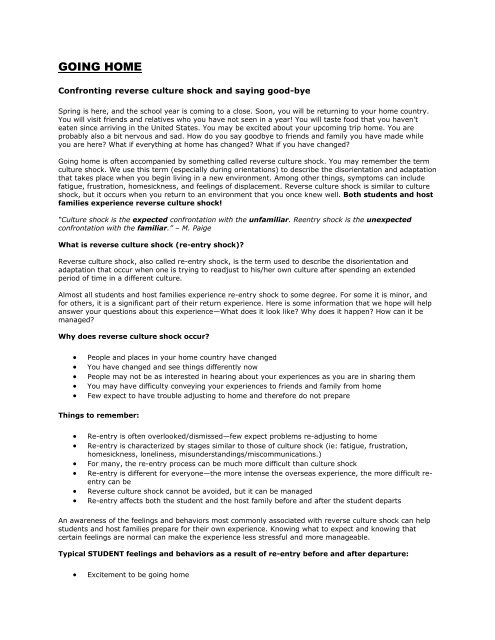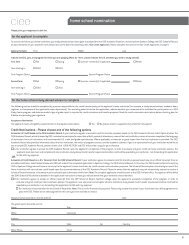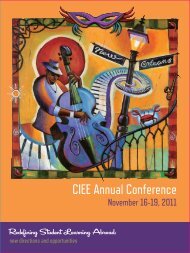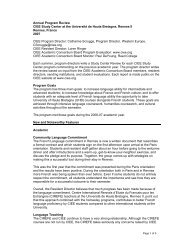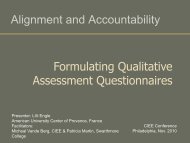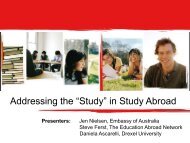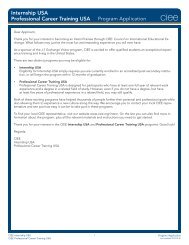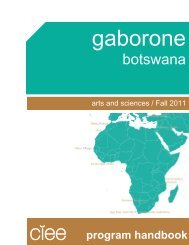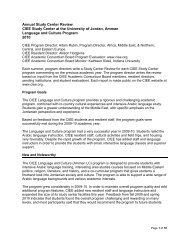Reverse Culture Shock
Reverse Culture Shock
Reverse Culture Shock
You also want an ePaper? Increase the reach of your titles
YUMPU automatically turns print PDFs into web optimized ePapers that Google loves.
GOING HOME<br />
Confronting reverse culture shock and saying good-bye<br />
Spring is here, and the school year is coming to a close. Soon, you will be returning to your home country.<br />
You will visit friends and relatives who you have not seen in a year! You will taste food that you haven’t<br />
eaten since arriving in the United States. You may be excited about your upcoming trip home. You are<br />
probably also a bit nervous and sad. How do you say goodbye to friends and family you have made while<br />
you are here What if everything at home has changed What if you have changed<br />
Going home is often accompanied by something called reverse culture shock. You may remember the term<br />
culture shock. We use this term (especially during orientations) to describe the disorientation and adaptation<br />
that takes place when you begin living in a new environment. Among other things, symptoms can include<br />
fatigue, frustration, homesickness, and feelings of displacement. <strong>Reverse</strong> culture shock is similar to culture<br />
shock, but it occurs when you return to an environment that you once knew well. Both students and host<br />
families experience reverse culture shock!<br />
“<strong>Culture</strong> shock is the expected confrontation with the unfamiliar. Reentry shock is the unexpected<br />
confrontation with the familiar.” – M. Paige<br />
What is reverse culture shock (re-entry shock)<br />
<strong>Reverse</strong> culture shock, also called re-entry shock, is the term used to describe the disorientation and<br />
adaptation that occur when one is trying to readjust to his/her own culture after spending an extended<br />
period of time in a different culture.<br />
Almost all students and host families experience re-entry shock to some degree. For some it is minor, and<br />
for others, it is a significant part of their return experience. Here is some information that we hope will help<br />
answer your questions about this experience—What does it look like Why does it happen How can it be<br />
managed<br />
Why does reverse culture shock occur<br />
<br />
<br />
<br />
<br />
<br />
People and places in your home country have changed<br />
You have changed and see things differently now<br />
People may not be as interested in hearing about your experiences as you are in sharing them<br />
You may have difficulty conveying your experiences to friends and family from home<br />
Few expect to have trouble adjusting to home and therefore do not prepare<br />
Things to remember:<br />
<br />
<br />
<br />
<br />
<br />
<br />
Re-entry is often overlooked/dismissed—few expect problems re-adjusting to home<br />
Re-entry is characterized by stages similar to those of culture shock (ie: fatigue, frustration,<br />
homesickness, loneliness, misunderstandings/miscommunications.)<br />
For many, the re-entry process can be much more difficult than culture shock<br />
Re-entry is different for everyone—the more intense the overseas experience, the more difficult reentry<br />
can be<br />
<strong>Reverse</strong> culture shock cannot be avoided, but it can be managed<br />
Re-entry affects both the student and the host family before and after the student departs<br />
An awareness of the feelings and behaviors most commonly associated with reverse culture shock can help<br />
students and host families prepare for their own experience. Knowing what to expect and knowing that<br />
certain feelings are normal can make the experience less stressful and more manageable.<br />
Typical STUDENT feelings and behaviors as a result of re-entry before and after departure:<br />
<br />
Excitement to be going home
Sadness that the host family is making plans beyond your stay<br />
Tendency to withdraw from the host family—it may seem easier to say goodbye if you do not feel as<br />
close to your host family<br />
Confusion about why the host family may be pulling away from you<br />
Honeymoon period initially when returning home—it is great to be back and to see everyone<br />
Difficulty becoming accustomed to your own culture<br />
Tendency to compare everything to the U.S.—others are not as interested in these comparisons<br />
Homesickness for the U.S<br />
Questioning interests and what to do next<br />
Feelings that no one understands what you are going through<br />
Feelings that you have changed, but people expect you to be the same<br />
Typical HOST FAMILY feelings and behaviors as a result of re-entry before and after departure:<br />
<br />
<br />
<br />
<br />
<br />
<br />
<br />
<br />
Sadness that the student is making plans for after he/she gets home<br />
Looking forward to some privacy<br />
Tendency to withdraw from the student—it may seem easier to say goodbye if you do not feel as<br />
close to the student<br />
Frustration that the student may be withdrawing from you<br />
Sense of relief once the student is gone<br />
Dealing with withdrawal—sense of grief at the loss of the student<br />
Questioning interests and what to do next.<br />
Feelings of loneliness; “empty-nest syndrome”<br />
Now that you have seen some of the typical feelings and behaviors to expect, students and host families can<br />
work together to make re-entry as painless as possible. Separation and letting go is never easy. However,<br />
with every end comes a new beginning and we hope that students and host families will feel enriched as a<br />
result of this experience.<br />
Following are some suggested coping strategies for both the student and the host family to utilize both<br />
before and after the student departs. Hopefully, if you put some of these practices in place, you will be<br />
prepared to face the challenges that re-entry presents.<br />
Coping strategies for STUDENT and HOST FAMILY while student is still in U.S.:<br />
<br />
<br />
<br />
<br />
<br />
<br />
<br />
<br />
<br />
<br />
Recognition and awareness of reverse culture shock—be aware of the typical stages<br />
Prepare yourself by thinking about how you have dealt with culture shock<br />
Communication—students and host families should discuss the inevitability of the student’s<br />
departure. When making future plans beyond the program, acknowledge that it may be difficult for<br />
the other party to hear about them<br />
Understand that the other’s behavior may be affected by reverse culture shock<br />
Students should keep in touch with family and friends back home (within reason)<br />
Students and host families should be aware of news, changes, and trends within the student’s home<br />
community, city, and country<br />
Take some time for introspection—consider how you have learned, changed, and grown from the<br />
experience<br />
Compare both cultures—student, consider what aspects of American culture you would like to take<br />
home with you—host families, consider what aspects of the student’s culture you would like to<br />
incorporate into your life<br />
Bring closure to your experience—say “goodbye” and “thank you”, make a scrapbook together,<br />
make plans for continuing your relationship<br />
Discuss expectations for the student’s return home and whether or not they may be realistic—<br />
consider on what terms you are all hoping to keep in touch<br />
Coping strategies for STUDENT and HOST FAMILY when student is at home:
Be patient with yourself—adjustment takes time<br />
Realize that most people will not be as interested in your experiences as you are—be sure to<br />
express interest in others’ lives as well<br />
Connect with other study abroad students and host families who may be going through a similar<br />
adjustment<br />
Students, share your perspectives and expertise with community and school groups interested in<br />
learning about the U.S., American culture, or English language<br />
Host families, share your perspectives with others about your student’s country, culture, or<br />
language<br />
Be a mentor for others who are planning to study abroad or are currently abroad<br />
Be a mentor for other host families<br />
Students, encourage your family to host an exchange student<br />
Host families, you may want to host again, encourage others to host, or think about having your<br />
children study abroad<br />
Get involved in the international community in your locale<br />
Reflect—keep a journal or make a scrapbook<br />
Write letters or send e-mails to continue the life-long relationship you have been building with one<br />
another<br />
Students, find ways to incorporate American culture with your own culture<br />
Host families, find ways to incorporate your student’s culture with your own culture<br />
“What we call the beginning is often the end. And to make an end is to make a beginning. The end is where<br />
we start from.” – T.S. Elliot


